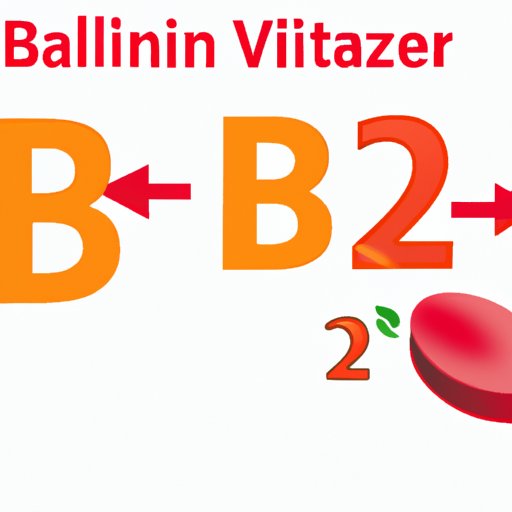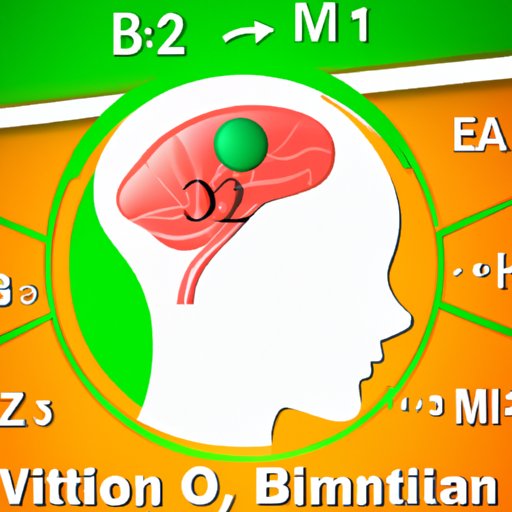
Introduction
Vitamin B12, also known as cobalamin, is one of the B vitamins that is essential to our overall health and well-being. It is required for many critical processes in the body, including DNA synthesis, nerve function, and the formation of red blood cells. Unfortunately, many people are deficient in this critical nutrient, which can lead to a range of health issues. In this article, we will provide a comprehensive guide to Vitamin B12, including its functions, benefits, and deficiencies.
The Ultimate Guide to Vitamin B12: Functions, Benefits, and Deficiencies
Vitamin B12 is a water-soluble vitamin that plays a key role in many processes throughout the body. It is required for the formation of DNA and red blood cells, as well as the proper functioning of the nervous system. Additionally, Vitamin B12 is essential for the metabolism of certain amino acids and fatty acids. Some of the benefits of Vitamin B12 include:
- Supporting brain function and cognitive health
- Aiding in the production of red blood cells
- Improving energy levels and reducing fatigue
- Supporting the immune system
- Promoting healthy skin, hair, and nails
A deficiency in Vitamin B12 can lead to a range of health issues, including anemia, neurological problems, and digestive issues. Some of the symptoms of Vitamin B12 deficiency include fatigue, weakness, tingling in the hands or feet, difficulty concentrating, and memory loss. Dietary deficiencies of Vitamin B12 are common among vegans and vegetarians, as well as people who have had gastrointestinal surgery or have certain medical conditions that impact nutrient absorption.
Why Vitamin B12 is Essential for a Healthy Lifestyle
Getting enough Vitamin B12 is essential for maintaining optimal health and well-being. This vitamin is required for many critical processes in the body, including proper brain function, red blood cell production, and the maintenance of a healthy nervous system. A deficiency in Vitamin B12 can weaken the immune system and lead to an increased risk of disease and illness.
Research has shown that maintaining adequate levels of Vitamin B12 can also improve energy levels and reduce feelings of fatigue. This is because Vitamin B12 helps to convert food into energy that the body can use. Additionally, some studies have suggested that Vitamin B12 may help to support cognitive function and memory in older adults.
Exploring the Role of Vitamin B12 in Energy Production and Brain Function
Vitamin B12 is critical to the body’s energy production processes. When we eat food, it is broken down into glucose, which is used by the body as fuel. Vitamin B12 helps to convert glucose into energy that can be used by our cells. Additionally, this vitamin plays a key role in the synthesis of neurotransmitters, which are chemicals that allow nerve cells to communicate with one another. These neurotransmitters are essential to proper brain function, and a deficiency in Vitamin B12 can lead to neurological issues such as depression, memory loss, and mood disorders.
What You Need to Know About Vitamin B12: A Comprehensive Overview
Overall, getting enough Vitamin B12 is essential to maintaining optimal health and well-being. The recommended dietary allowance for adults is 2.4 micrograms per day, although this may vary depending on certain factors such as age, gender, and medical history. There are several ways to ensure that you are getting enough Vitamin B12, including:
- Eating foods that are high in Vitamin B12, such as meat, fish, dairy, and eggs
- Taking a Vitamin B12 supplement
- Getting a Vitamin B12 injection
If you are unsure about your Vitamin B12 status, it is important to speak with your doctor. They may recommend a blood test to determine your levels and whether or not you need to increase your intake of this essential nutrient.
The Link Between Vitamin B12 and Red Blood Cell Formation
Vitamin B12 is critical to the formation of red blood cells, which are responsible for carrying oxygen throughout the body. Without enough Vitamin B12, the body cannot produce healthy red blood cells, which can lead to anemia. Anemia is a condition in which the body does not have enough red blood cells to deliver oxygen to the tissues, which can cause fatigue, weakness, and shortness of breath. If you are experiencing these symptoms, it is important to speak with your doctor and get your Vitamin B12 levels tested.

Vitamin B12 and the Nervous System: Discovering the Connection
Another critical role of Vitamin B12 is in maintaining a healthy nervous system. Vitamin B12 is required for the proper formation of myelin, which is a protective sheath that surrounds nerve cells. A deficiency in Vitamin B12 can lead to demyelination, which is the breakdown of the myelin sheath. This can cause neurological issues such as tingling in the hands or feet, muscle weakness, and difficulty walking. It is important to maintain proper levels of Vitamin B12 to ensure a healthy nervous system.
Top Foods that are High in Vitamin B12 and How to Incorporate Them in Your Diet
There are many foods that are high in Vitamin B12, including:
- Beef, chicken, and pork
- Fish and shellfish
- Dairy products such as milk, cheese, and yogurt
- Eggs
- Foods that are fortified with Vitamin B12, such as breakfast cereals and nutritional yeast
If you are a vegan or vegetarian, it is important to ensure that you are getting enough Vitamin B12 through fortified foods or supplements. You can also try incorporating more plant-based sources of Vitamin B12 into your diet, such as tempeh, nori, and chlorella.
Conclusion
Vitamin B12 is an essential nutrient that plays a critical role in our overall health and well-being. From energy production to red blood cell formation to brain function, this vitamin is required for many vital processes in the body. Unfortunately, many people are deficient in Vitamin B12, which can lead to a range of health issues. To maintain optimal levels of this essential nutrient, it is important to eat a balanced diet that includes foods that are high in Vitamin B12, or to take a supplement or get injection as recommended by your doctor.





